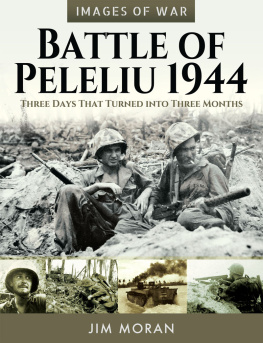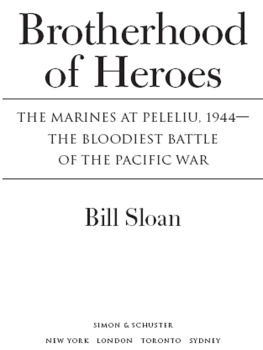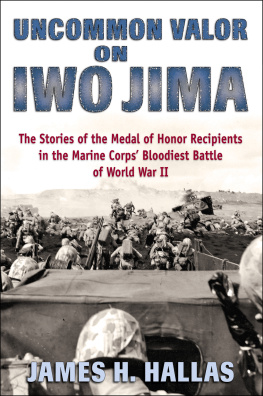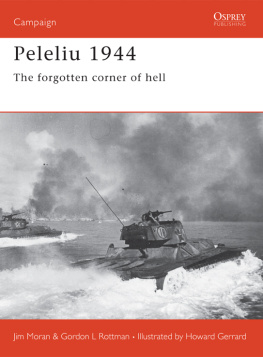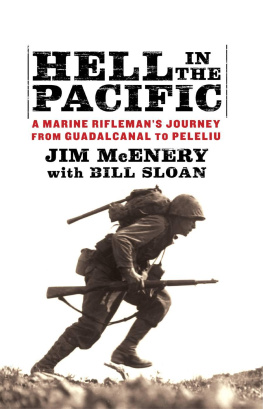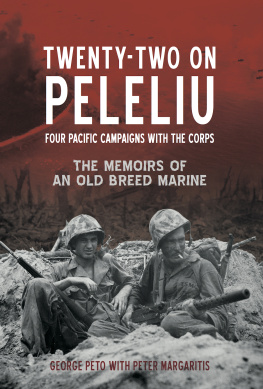LAST MAN
STANDING
THE 1ST MARINE REGIMENT ON PELELIU
SEPTEMBER 1521, 1944
DICK CAMP

First published in 2008 by Zenith Press, an imprint of MBI Publishing Company, 400 First Avenue North, Suite 300, Minneapolis, MN 55401 USA
Copyright 2008, 2010 by Dick Camp
Hardcover edition published in 2008. Digital edition 2010.
All rights reserved. With the exception of quoting brief passages for the purposes of review, no part of this publication may be reproduced without prior written permission from the Publisher. The information in this book is true and complete to the best of our knowledge.
Zenith Press titles are also available at discounts in bulk quantity for industrial or sales-promotional use. For details write to Special Sales Manager at MBI Publishing Company, 400 First Avenue North, Suite 300, Minneapolis, MN 55401 USA.
To find out more about our books, join us online at www.zenithpress.com .
Digital edition: 978-1-61673-241-7
Hardcover edition: 978-0-7603-3493-5
Designer: Helena Shimizu
Printed in the United States of America
Library of Congress Cataloging-in-Publication Data
Camp, Richard D.
Last man standing : the 1st Marine Regiment on Peleliu, September 15-21, 1944 / Dick Camp.
p. cm.
Includes bibliographical references and index.
ISBN-13: 978-0-7603-3493-5 (hbk.)
ISBN-10: 0-7603-3493-5 (hbk.)
1. Peleliu, Battle of, Palau, 1944. 2. United States. Marine Corps. Marines, 1st. 3. World War, 1939-1945Regimental historiesUnited States. I. Title. II. Title: 1st Marine Regiment on Peleliu, September 15-21, 1944. III. Title: First Marine Regiment on Peleliu, September 15-21, 1944.
D767.99.P4C36 2008
940.542666--dc22
2008024341
Richard David Chip Camp III
Beloved Son
19702007
CONTENTS
INTRODUCTION
In 1969, I accompanied Maj. Gen. Ray Davis to Albany, Georgia, where he addressed a luncheon of senior officers. Afterward we returned to the VIP quarters to relax. Nothing further was on his schedule and I was desperately searching for something to occupy the timean aide de camp abhors a vacant schedule. I noticed a Leatherneck magazine lying on the coffee table, its masthead trumpeting 25th Anniversary of Peleliu. I handed it to Davis, saying, General, its your anniversary. I knew the Old Man had been a battalion commander in the 1st Marine Regiment, under the famous Lewis B. Chesty Puller. He got a pensive look on his face as he leafed through the article, scrutinizing closely the half-dozen photographs. After several moments, he sat back and said, Dick, it was a terrible battlecasualties were just unbelievable.
Peleliu was a battle that should not have happened. Initially planned to support MacArthurs return to the Philippines, the bloody assault on this small seven-square-mile coral island was declared to be unnecessary by Adm. William F. Bull Halsey, Jr., after his fast carrier strike force found the Philippines ripe for the picking. He recommended canceling the operation but was overruled by Fleet Adm. Chester Nimitza controversial decision that signed the death warrant for thousands of Americans and Japanese.
On September 15, 1944, twenty-five thousand men of the famed 1st Marine Division stormed ashore. Six days later, after suffering more than 50 percent casualties, one of its regiments was taken off the line over the strenuous objections of the division commander, Maj. Gen. William H. Rupertus, and replaced by soldiers of the 81st Wildcat Division. Rupertus, an acerbic, contentious officer, was vehemently opposed to using soldiers and had to be ordered to use them by his superior, Maj. Gen. Roy S. Geiger.
Even before the operation, Rupertus did not enjoy the confidence of his officers. One of his battalion commanders called him Rupe the Dupe and another thought he was a jackass. His boast that Peleliu would be captured within two days, three at the most, was wildly optimistic.
When the attack stalled, he ordered his commanders to make fruitless assaults against impregnable defenses. Ten thousand battle-hardened Japanese soldiers of Col. Kunio Nakagawas 2nd Infantry Regiment waited in the nearly impregnable caves and bunkers of the Umurbrogol Mountain, promising to bleed the Americans white. The 1st Marines, led by the legendary Chesty Puller, were ordered to attack head on into the teeth of Nakagawas defenses. Puller launched his infantry in attack after bloody attack, fulfilling Nakagawas wishful objective. Two of Pullers battalions lost 50 percent of their men, while Davis 1st Battalion lost seven out of ten men70 percentthe greatest number of casualties for a single unit in Marine Corps history.
Pullers famed reputation was severely tarnished. One survivor complained bitterly that the only scheme of maneuver he knows is fix bayonets and charge! Many thought Puller was simply out of touch with the actual conditions on the ground. His daily continue the attack! orders flew in the face of reality. His rifle companies were being savaged. C Company, 1st Battalion, reported fourteen men present for duty after one fruitless attack. Its company commander stated angrily, Why Puller wanted us dead on that hill has never been clear to me. Other detractors thought the loss of his brother on Guam colored his fanatical obsession with coming to grips with the Japanese. On Pavuvu, Puller erected a sign in the mess hall reading Kill Japs, Kill Japs, Kill Japs. He reminded his men to destroy the bandy-legged little bastards. Ray Davis said he was terribly bitter, because of the loss of his brother.
For the men of the 1st Marine Regiment on that September morning, Peleliu was nothing more than another storm landing. The division commander told them, Were going to have some casualties but let me assure you this is going to be a fast one, rough but fast. Their regimental commander was a certified hero with years of combat experiencean officer they could trust. Yet as the assault waves neared the beach, plumes of water rose in the air as Japanese gunners found the range. By the end of the first day, even the most optimistic Marine could sense this landing was going to be hellfive hundred of the regiments Marines were casualties. Bull Halsey had made an ominousand accurateprophesy: I felt [Peleliu] would have to be bought at a prohibitive price and I was right.
CHAPTER 1
BREAKWATER OF
THE PACIFIC
Hundreds of half-naked soldiers toiled in the broiling sun, sweat pouring off their torsos as temperatures soared into triple digits. One slumped to the ground, overcome with heat exhaustion. A comrade hurried to assist him but was brought up short by the angry bark of a non-commissioned officer, Shigoto ni kaere (Back to work)! Medical personnel quickly gathered up the unconscious soldier and bundled him off to one of the many camouflaged emplacements, out of the sun. The relentless digging continued at a frenzied pace; it was a matter of life and deaththe Americans were coming. One Peleliu defender said, The enemy has planned to land. Let them come if theyre coming. Who is afraid of the Americans? We will defend Peleliu to the death!
On this small island, we must fortify until it is like a big warship, one officer emphasized, a large, unsinkable warship. So-cho (Sergeant Major) Masao Kurihara, Imperial Japanese Army, remembered, At various battalion meetings I overheard the officers stress the importance of constructing fortifications. They said that Peleliu Island is the most important island in the Pacific for Japan. The Japanese pledged to break the Americans on their defensesMake the American Marines come to you, and when they do, kill them!



